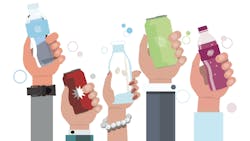Beyond hydration: Top 3 consumer beverage trends for vending and micro markets
According to Automatic Merchandiser’s latest State of the Industry for Vending and Micro Market Report, packaged cold beverages in 2022 were found to have generated 23% of revenue, or about $4.1 billion. With so much capital on the table, operators must be willing to offer beverages that meet consumer preferences. While traditional beverages (think sodas and energy drinks) might still be the staple in vending and micro market beverage sales, there are a lot of drinks on the market that are hitting on consumer demands. Operators should consider providing functional beverages, plant-based drinks and non-alcoholic spirits to give consumers on-trend options.
Functional beverages
Although consumers could – and certainly still do – turn to water to quench their thirst, they are also looking for their beverages to do more. Many consumers want a beverage that provides other benefits in the form of better immunity and sleep, as well as increased cognitive function and energy, to name a few. Beyond hydration, these functional beverages aim to hit on the increased consumer move toward better health and immunity. Not only do these enhanced beverages contain health-boosting elements like prebiotics and probiotics, they also can include vitamins and minerals and may come with reduced or zero sugar and all-natural ingredients.
Functional drinks are predicted to grab quite a bit of the consumer dollar in the coming years. In fact, in its 2023 “U.S. Functional Drinks Market Report,” ResearchAndMarkets.com predicts that the U.S. functional drinks market will grow from $45.32 billion in 2022 to $71.84 billion by 2028.
And in its report, “Global Food and Drink Trends for 2023,” Mintel predicted that, “Consumers will look for food and drink that influence cognitive capacity, manage stress levels and optimize brain function.” They predicted that brands would be promoting the cognitive boosts available from ingredients such as fruits, vegetables and legumes.
Over the last several years, manufacturers have been launching products that tout such health benefits. Health-Ade Kombucha offers its kombucha in cans that read, “bubbly probiotic tea for a happy gut.” Flavors include Pink Lady Apple, Ginger Lemon, Pomegranate and Passionfruit Tangerine. Not only are they offering a health-focused tea in several fruit varieties, but they also introduced a Glow Up variety pack that takes kombucha and combines it with added functional ingredients. For example, its Glow Up Kombucha Citrus Immune Boost has added vitamin C and zinc, while its Strawberry Glow comes with biotin and bamboo extract. The company even offers a functional soda alternative with prebiotics.
They aren’t the only company to do this. Remedy Organics, creators of plant-based wellness shakes, offers immunity shots – 2-fl-oz bottles that tout health and wellbeing benefits. Its Energize Immunity+ Shot provides consumers with a burst of energy with its matcha, ginger and L-theanine, while its Protect line of immunity shots provide consumers with 150% daily value of vitamin C using ingredients that include elderberry, ginger and cayenne.
Earlier this year, SmartSoda entered into the ready-to-drink (RTD) category with the launch of its Brilliant Life Drink line, which starts with vitamin-infused alkaline water. Designed with zinc, turmeric, ginger, magnesium and elderberry, the SmartSoda Optimize Plus Immunity line purports to aid in building immunity. This line includes flavors of Yuzu-Currant Noir, Posh Gran-Limone and Pomelo Breeze. The company’s Quantum collection includes ingredients such as L-theanine, which reportedly provides natural energy, paired with ginseng, guayusa and guarana to help with focus.
This move toward functional beverages is already permeating the vending, micro market and OCS industry. In fact, the NAMA Show 2023 People’s Choice Awards winner in the coffee, tea and hot beverages category was Twinings North America Superblends Cold Water Infusions Immune Support. Caffeine- and sugar-free, the Superblends Cold Water Infusions Immune Support provides consumers with 70% daily value of vitamin C per serving.
Consumers also chose a functional beverage as the runner-up in the 2023 Automatic Merchandiser Readers’ Choice New Products of the Year Awards in the cold beverage category. Cult Botanical Infusions beverages are sugar-free, vegan and keto friendly. This follows the 2022 cold beverage winner Celsius Holdings Tropical Vibe, which boasts seven essential vitamins and zero sugar.
In addition to health benefits, consumers are also looking for beverages with enhancements that don’t include sugar, and many companies are meeting the demand. Earlier this year, Monster Energy launched its original flavor with zero sugar. Meanwhile, Coca Cola’s Vitaminwater also announced two new flavors to its zero-sugar lineup, in addition to announcing that its sweetener formula would include monk fruit and stevia.
Vending, micro market and OCS operators have an opportunity to offer RTD beverages – from tea and coffee to kombucha and energy drinks – that provide customers with the health benefits and immune support they are looking for.
Dairy alternatives
For the better part of 10 years, non-dairy milk sales have been growing consistently as consumers have sought to diversify their beverage consumption. Market intelligence agency Mintel reported on this trend nearly five years ago, revealing that non-dairy milk sales grew 61% from 2012 to 2018. And it appears this trend may be here to stay. Global technology research and advisory company Technavio recently published data that found the dairy alternatives market size is expected to grow by $18.49 billion from 2022 to 2027.
In the vending, micro market and OCS channels, plenty of companies have been launching products to fit the consumer demand for dairy alternatives, from coffee creamers to RTD bottles. In 2019, La Colombe Coffee Roasters launched its Oatmilk Draft Latte in a 9-ounce RTD can. The following year, Nestle and Starbucks announced Starbucks Non-Dairy Creamers, made with a blend of almondmilk and oatmilk. Even Greek yogurt maker Chobani got into the category in 2022 by launching several dairy-free coffee creamers.
Some manufacturers are even combining several trends into a one-stop-shop beverage for customers. Lucky Jack Coffee, for example, launched two new flavors of its RTD oatmilk lattes that come with superfood ingredients: Vanilla Collagen and Mocha Adaptogenic. The dairy-free Vanilla Collagen Latte offers consumers collagen and protein while the Mocha Adaptogenic Latte contains adaptogens like maca and ashwagandha that can reportedly help reduce stress, boost the immune system and improve mental clarity. These drinks not only give customers a dairy-free coffee beverage, but they also have those functional benefits consumers crave.
Mocktails in micro markets
One beverage trend that has been steadily gaining in popularity over the last several years is the consumption of non-alcoholic beverages. According to consumer intelligence company NielsenIQ, between August 2021 and August 2022, total dollar sales of non-alcoholic drinks grew more than 20% to reach $395 million.
This comes as more consumers are embracing a “sober curious” lifestyle in which they opt for alternatives to alcohol. Mintel found that nearly a quarter of U.S. consumers closely or occasionally follow a sober curious lifestyle. Mintel data also found that 52% of Americans believe restaurants should offer more mocktails, a non-alcoholic cocktail.
This is a trend that some beverage companies are already betting on. In 2022, Keurig Dr Pepper announced an agreement to acquire the global rights to the non-alcoholic, RTD cocktail brand Atypique. Several months later, the company also announced its investment in the non-alcoholic craft beer maker Athletic Brewing Company.
In addition, sparkling water company Spindrift launched four new flavors earlier this year, including the mocktail-inspired Nojito based on the mojito cocktail. The Nojito is Spindrift’s first mocktail-style beverage.
Vending and micro market operators have an opportunity to benefit from this trend. With several RTD non-alcoholic spirits on the market, operators can embrace Dry January or Sober October by offering RTD mocktails. Using digital signage and promotions, operators can try introducing new mocktails during National Mocktail Week, celebrated the second full week of January. These are just a few ways how vending and micro market operators can capitalize on the popularity of mocktails – or non-alcoholic beverages in general – especially in the right location.
Because beverage trends change through the years, there’s no telling which ones will stick. But with so many products vying for the consumer dollar, it is worthwhile to try something new and offer a beverage that is beyond hydration.
About the Author

Adrienne Klein
Contributing Editor
Adrienne Zimmer Klein is a freelance writer with a background in the vending, micro market and office coffee service industry. She worked as an associate editor and managing editor at Automatic Merchandiser and VendingMarketWatch.com from 2013 until 2017. She is a regular contributing writer at Automatic Merchandiser.
